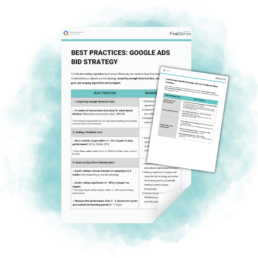In this article, we’ll explore the most common issues that can derail your Google Ads bidding strategy and discuss how to fix them. A Google Ads bid is the amount you’re willing to pay for a click on your ad, influencing where your ad appears (the ad’s placement). Understanding this core concept is vital before adjusting any bidding tactics.
Automated bidding in Google Ads is meant to grant efficiency. Bid strategies like Maximize Conversions or Target ROAS (tROAS) manage bid adjustments to help you reach your goals faster.
However, PPC managers understand that even with AI and machine learning capabilities, bid strategies don’t always deliver expected results.
This analysis demonstrates that bidding success requires more than simply activating automation—it demands proper setup, realistic expectations, and truth be told:disciplined management.
Why “good” bid strategies underperform
Automated bidding algorithms rely heavily on input signals. If your campaign environment isn’t stable, you may get underperforming bid strategies.
- Insufficient historical data for the algorithm to learn effectively
- Misaligned campaign goals and bid strategies
- External auction factors impacting performance
1. Lack of historical data
Algorithms need enough historical data to properly learn. Without it, bidding decisions become unstable, resulting in campaign performance fluctuations that can persist for weeks.
2. Unrealistic performance targets
Setting a target CPA or ROAS that’s too aggressive—especially compared to past campaign performance—forces the algorithm to learn based on unrealistic outcomes. This can slow optimization or even suppress delivery.
When setting a target CPA or ROAS, it’s important to consider both campaign history and your profit margins. Use Target CPA when your primary goal is to control cost per acquisition, and Target ROAS when you want to maximize revenue for every dollar spent.
3. Interrupted learning
Bid strategies need a stabilization window to learn. Frequent changes to settings, such as budgets, campaign goals, or targets during this period can reset learning, leading to unstable performance and wasted spend.
Why bid strategy management often goes off track
Based on our analysis of client bid strategy implementations, several recurring challenges consistently impact performance:
Misaligned Strategy and Campaign Goals
It’s more common than you’d think—teams want to drive conversions but set the campaign to Maximize Clicks. When the bid strategy doesn’t reflect the right goal, performance insights become misleading, and the budget gets misallocated.
Activating Automation Without Data
Automated bidding relies heavily on historical data to learn effectively. But new campaigns are often launched with automated strategies before any baseline performance is available, making target setting a kind of guessing game.
Unrealistic Performance Targets
Targets like tCPA or tROAS are sometimes set too aggressively at the start— and sometimes never reviewed after launch. Without adjusting to actual performance, the algorithm can’t optimize effectively.
Too Many Changes
Frequent edits, such as changing budgets, targets, or bid strategies—can reset the learning phase and prevent the algorithm from stabilizing. This leads to performance swings and missed optimization windows.
The good news? These challenges are avoidable with the right framework and a bit of discipline. If there isn’t a proper process when it comes to bidding setup, learning and optimisation, you’re more likely to experience challenges like above.
Next Steps: Ready to Strengthen Your Bidding Strategy?
We’ve created a practical Best Practice guide, tailored for PPC managers using Google Ads. It walks you through how to review your current bid strategies, manage learning phases more effectively, and set realistic goals that lead to greater stability. You’ll also gain an understanding of how Search Ads 360 (SA360), an advanced enterprise search management platform, can provide the additional control you need to optimise performance at scale.

Download our Best Practice guide and review in detail if your bid strategy has these 3 core best practices:
- Having enough historical data: How much is enough?
- Having realistic goals - with actual benchmark ranges for CPA, ROAS, and CPC
- Having uninterrupted algorithms - what should you do during a "quiet" period?
